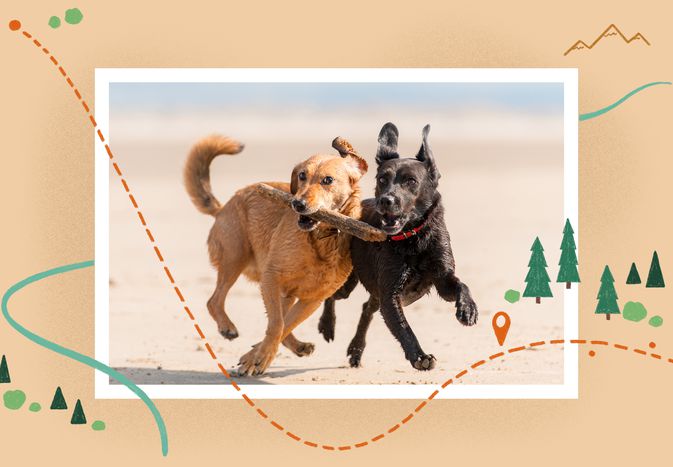Almonds are a nutritious and satisfying snack for humans, but can dogs eat almonds, too? While almonds are not considered toxic to dogs and a couple likely won’t do any harm, these nuts should be kept away from your pup, says Antje Joslin, DVM.
Here are all the potential risks associated with giving almonds to dogs and what to do if your curious pooch manages to snag a mouthful.
Meet the Expert
Antje Joslin, DVM, is the co-owner of Tolleson Animal Clinic and Dogtopia veterinary consultant.
Are Almonds Safe for Dogs?
Unlike certain human foods like grapes and onions, almonds are not inherently toxic to dogs. However, they’re not a good treat for your pup for a few reasons:
Hard to Digest
Dogs can’t properly digest the proteins in almonds, Joslin says. While they can likely get away with eating a couple, too many can cause vomiting, diarrhea, gas, and loss of appetite.
High in Fat
The high fat content of almonds is another concern for dogs. Consumption of fatty foods can lead to gastric intestinal distress, causing discomfort, bloating, and potentially more severe complications, such as pancreatitis, Joslin says. Pancreatitis is a serious condition characterized by inflammation of the pancreas, which can result in vomiting, diarrhea, abdominal pain, and, in severe cases, organ failure.
Choking and Obstruction Hazard
If a dog swallows almonds without adequately chewing them, the almonds could become lodged in their throat or small intestine, leading to choking or an intestinal blockage, Joslin says. This risk is more common in smaller dog breeds, dogs with pre-existing dental issues, and dogs who tend to gulp their food down.
Harmful Seasonings
Almonds are often seasoned or flavored with salt, various spices, chocolate, or other additives to enhance their taste. These flavorings can be harmful or—in the case of garlic, onion, and chocolate—even toxic to dogs.
Almond Poisoning in Dogs
Almonds are not directly toxic to dogs and almond poisoning is uncommon. Still, pet parents need to be cautious and keep their dogs away from this nut. The amount of unflavored almonds it would take to cause problems for a dog depends on their size and individual sensitivity. If a Great Dane eats a few plain almonds, they likely won’t experience any negative effects. But the same amount of almonds could affect smaller breeds, like pugs and Chihuahuas.
Signs that your dog is being negatively affected by almonds may include:
- Choking
- Gagging
- Bloating
- Vomiting
- Diarrhea
- Lethargy
You should contact your veterinarian ASAP or take your dog to an emergency vet clinic if:
- You notice any of the above signs
- Your dog ate a large amount of almonds, say a handful or a whole bag
- Your dog ate almonds that are coated in spices or chocolate
“A veterinarian may induce vomiting if a large quantity of almonds was recently consumed,” says Joslin. They may also provide supportive care for gastrointestinal illness, such as IV fluids, antiemetics, and pain management, she adds. Never induce vomiting at home unless specifically instructed by your vet.
You can also call the ASPCA Animal Poison Control Center at (888) 426-4435 for advice. Note that a consultation fee may apply.
Guidelines for Feeding Almonds to Dogs
It’s best to avoid feeding almonds to dogs altogether due to the potential risks. However, if you still wish to offer almonds to your canine companion or they snag some from your snack bowl, it’s crucial to follow these guidelines to minimize the risk of adverse effects:
- Plain and unsalted almonds only: Avoid flavored or seasoned almonds, as they may contain ingredients that are harmful or toxic to dogs, such as salt, spices, sweeteners, or artificial additives.
- Moderation is key: Almonds should be avoided in dogs if at all possible and if done only offer to your dog as an occasional treat (think 1-2 almonds every few days if a large breed dog).
- Supervise consumption: Always supervise your dog while they’re eating almonds to ensure they chew them thoroughly and don't swallow them whole.
- Watch for adverse reactions: Monitor your dog for any signs of gastrointestinal upset or other adverse reactions after consuming almonds. If you notice any concerning symptoms, refrain from giving them any more almonds and consult your veterinarian for guidance.
What about almond butter or almond milk? Almond butter carries the same risks as almonds (minus the choking risk) and should not be given to dogs (although a tiny taste here and there likely won't have a negative effect). Almond milk is safe to give occasionally in small amounts, Joslin says. But really, there's no need to purposefully share almonds with your dog.
Alternative Nutritious Treats for Dogs
Unlike humans, dogs don’t get nutritional benefits from almonds. Plus, they can cause your pup harm. Instead of almonds, it’s best to offer your dog treats that are safe and nutritious for them. Here are some options your dog will go nuts for:
- Fresh fruits and vegetables: Many fruits and vegetables make excellent treats for dogs in moderation. Options like apple slices (without seeds), blueberries, strawberries, watermelon, celery, and carrots are low in calories and packed with vitamins and minerals.
- Commercial dog treats: There are countless varieties of commercial dog treats on the market that are formulated specifically for canine consumption. Look for treats made from high-quality ingredients without added fillers, artificial preservatives, or additives. Choose treats that are appropriate for your dog's size and dietary needs.
- Training treats: Small, soft, and chewy treats designed for training purposes are perfect for rewarding good behavior and reinforcing commands during training sessions.
- Dental chews: Dental chews are specially formulated to promote dental health by reducing plaque and tartar buildup and freshening breath.
- Frozen treats: During hot weather, frozen treats can be a refreshing and enjoyable snack for dogs. You can make homemade pup-sicles using ingredients like plain yogurt, pureed fruits, or broth. Just be sure to avoid using ingredients that are toxic to dogs, such as chocolate, grapes, and xylitol.










Comments on " Can Dogs Eat Almonds? Understanding the Risks and Guidelines" :